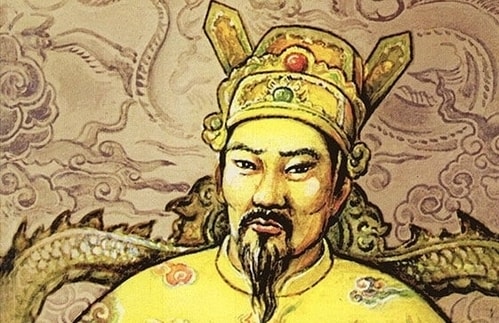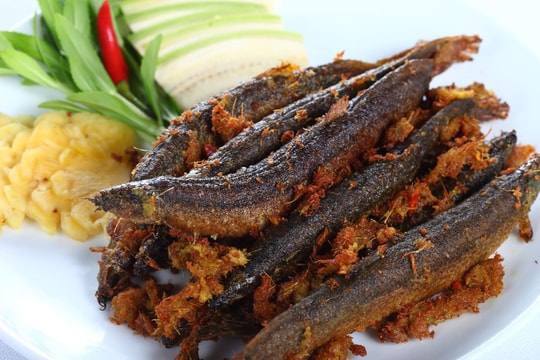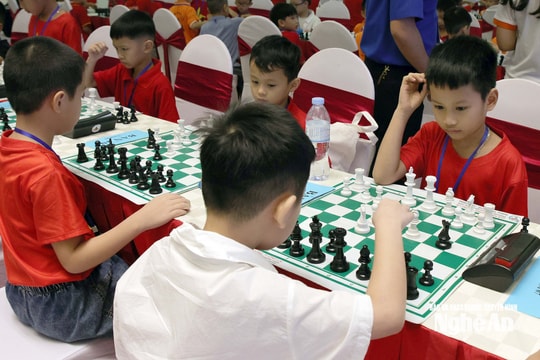King Le Thai Tong strictly observed the law.
The young king was praised as a wise man, and the country under his reign was the most prosperous during the Later Le Dynasty.
After Le Thai To passed away (1433), Crown Prince Le Nguyen Long succeeded to the throne, taking the name Le Thai Tong. He was only 11 years old when he ascended the throne, but with his intelligence, he did not need the Queen Mother to act as regent and decided on the affairs of the court himself. Many stories were recorded in history books, showing the young king's strict adherence to the law.
Complete Annals of Dai VietIn the first year of Thieu Binh (1434), the court executed the thief Trinh Duong. The official of the Government and advisor Nguyen Han said: "Duong stole in broad daylight, but according to the law, he does not deserve to be executed, he should not be killed", however, the king did not listen.
Many chefs of noble families often used the excuse of being in the palace to bully sellers and buy goods at low prices in the market, making the people very afraid. There was a chef at the Nguyen Chu temple who was accused of bullying and buying goods at low prices. King Thai Tong immediately ordered Chu to be punished, beaten 80 times with rods, branded on the back of his neck, transferred to be an elephant keeper, and announced for three days so that everyone would know.
The court issued an order prohibiting officials and people from secretly trading foreign goods. At that time, a merchant ship from Trao Oa (Java, present-day Indonesia) arrived at Van Don town. The two general managers, Nguyen Tong Tu and Le Dao, who were in charge of checking and recording the number of goods on the ship, colluded to report the wrong quantity of goods. They secretly sold them for more than 900 quan of money, each person taking more than 100 quan. When the incident was discovered, both were demoted three ranks and dismissed.
Another story that shows Le Thai Tong's fairness is when Phan Thien Tuoc submitted a memorial to impeach Tien Quan Tong Quan Le Thu for the following: getting married during the national mourning of King Le Thai To, building a big house, and sending family members abroad to secretly trade with foreign countries.
|
During the reign of King Le Thai Tong, the country was prosperous. Illustration:History of Vietnam in Pictures. |
The King asked: "Don't all the ministers have such a story? Why do you only report about Thu?" Thien Tuoc replied: "Admiral Tu Khau and Tu Ma are both great ministers, they must keep themselves upright to lead hundreds of officials, and must follow the rites in all their work. We cannot help but speak. Moreover, we see that Thu has several matters that we should all speak about at once."
Hearing that many mandarins were using soldiers to build big houses for themselves, the king sent Phan Thien Tuoc to investigate. Thien Tuoc submitted a memorial listing more than 20 names.
The king did not ask anyone, only ordered to search Le Thu alone. Admiral Le Van and Tu Ma Le Ngan thought Le Thu was a meritorious official so they tried to help. The king then pardoned Thu's other crimes, only confiscating 15 taels of gold and 100 taels of silver from clandestine trading with foreign countries. According to the king's order, Thu's newly married concubine Trinh Thi had to be removed from Thu's household register and redeemed as an outsider.
Although he was strict with the law, King Le Thai Tong also decided to show mercy. In 1436, there were seven thieves who reoffended and were sentenced to death by beheading. The Grand Tutor Le Sat felt hesitant when he saw that there were too many people being killed.
The King asked the Prime Minister Nguyen Trai about this and was told: "Killing seven people at once is not the act of a great virtue. A king must keep his heart in humanity and consider humanity as his place. Although there are times when he shows off his power and anger, he cannot do so forever. I ask Your Majesty to pay attention to my words."
Although the mandarins Le Sat and Le Ngan criticized Nguyen Trai, King Thai Tong decided to only execute two of them and exile the rest.
Complete Annals of Dai VietKing Le Thai Tong was commented as a person "with a bright mind, who continued the period of peace; he was mostly lenient in sentencing prisoners and judging cases".Unfortunately, during his Eastern tour in August 1442, the king suddenly passed away at Le Chi Vien at the age of 20, causing an unjust case that led to the extermination of the family of the meritorious mandarin Nguyen Trai. However, his reign was considered the most prosperous period of the Later Le Dynasty, and was praised by the people through the poem: "During the reign of King Thai To and King Thai Tong, the fields were full of rice, but the buffaloes did not bother to eat it."







.jpg)

